Ba10.9
Maybe we should
therefore consider the last text line (with 32 glyphs) on side a of the B tablet as a special
case.
... The north
pole slowly moved in a circle ... inside these walls of Ming Thang,
The Bright Palace, 'the mystical
temple-dwelling which the emperor was supposed to frequent, carrying out the
rites appropriate to the seasons' ...
But other (complementary) interpretations are also possible. For instance
would it be easy to read 421 as the sum of 300 days ruled by the Sun and 121 (→
Beltaine) nights waiting for his next return.
 |
 |
 |
 |
 |
 |
 |
| Kua oho
ki te nuku honu |
mai tae
huri ïa |
ki te
motomotou honu |
kua tuu
ki te hau tea |
e vaha
te manu ariga hiti |
kua vero
ko te tai |
mai tae
noho ki te hau tea |
|
Huri. 1. To turn (vt.), to
overthrow, to knock down: huri moai, the
overthrowing of the statues from their ahus during the
period of decadence on the island. 2. To pour a liquid
from a container: ka huri mai te vai, pour me some water.
3. To end a lament, a mourning: he huri i te tagi, ina
ekó tagi hakaou, with this the mourning (for the deceased)
is over, there shall be no more crying. 4. New shoot of
banana: huri maîka. Vanaga. 1. Stem. P Mgv.: huri,
a banana shoot. Mq.: hui, shoot, scion. 2. To turn over,
to be turned over onto another side, to bend, to lean, to warp;
huri ke, to change, to decant; tae huri ke,
invariable; huri ke tahaga no mai, to change as the wind;
tae huri, immovable; e ko huri ke, infallible;
huhuri, rolling; hakahuri, to turn over; hakahuri
ke, to divine. P Pau.: huri, to turn. Mgv.: huri,
uri, to turn on one side, to roll, to turn upside down,
to reverse. Mq.: hui, to turn, to reverse. 3. To throw,
to shoot. 4. To water, to wet. 5. To hollow out. Hurihuri:
1. Wrath, anger; kokoma hurihuri, animosity, spite,
wrath, fury, hate, enmity, irritable, quick tempered, to feel
offended, to resent, to pester; kokoma hurihuri ke, to be
in a rage. 2. (huri 4) hurihuri titi, to fill up.
3. To polish. 4. (uriuri). Hurikea, to
transfigure, to transform. Churchill. Mq. huri,
resemblance. Sa.: foliga, to resemble. Churchill.
Tai.
1. Ocean, sea (often used without an article); he-turu au ki
tai hopu, I am going down to the sea to bathe. 2. To be
calm, good for fishing: he tai. There exists a
surprisingly developed terminology for distinguishing the phases
of the tides: tai pâpaku, low tide; ku-gúgú-á te tai,
tide at his lowest, literally 'the sea has dried up';
he-ranu te tai, when the water starts rising again; this is
a strange expression, since ranu means 'amniotic liquid,'
the breaking of the waters which precedes birth; in this phase
of the tides the fish start coming out of their hiding places
and swim to the coast in search of food; tai hahati,
rising tide; tai hini hahati, tide as it continues
rising; tai u'a, tai u'a parera, when the tide has
reached its high; tai hini u'a, tide all throughout its
full phase; tai hori, tide as it starts receding; tai
ma'u, tide during its decreasing phase, right until it
becomes tai pâpaku again; tai raurau a riki, the
slight swell, or effervescence of the sea at a change of the
moon. 3. Good spot for raising chickens; the stone chicken coops
called hare moa, were built in places 'tai moa'.
Ahé te tai o taau moa? whereabouts are the raising grounds
of your chickens? 4. Song in general; song executed by a group
of singers; ku-garo-ana i a au te kupu o te tai, I have
forgotten the words of the song. Taitai, tasteless; said
especially of sweet potatoes and other produces of the soil
which do not taste good for being too watery; kumara taitai,
watery, tasteless sweet potato. Vanaga. 1. Salt water;
taitai, brackish, salty. P Mgv., Mq., Ta.: tai, salt
water. Mq.: taitai, to salt. Ta.: taitai, salty.
2. Sea, ocean; tai hati, breakers; tai hohonu,
depths of the sea; tai kaukau, tide; tai negonego,
tide; tai o, ripple; tai parera, tide; tai poko,
breakers; tai titi, tide; tai ua, tide, ebb;
tai vanaga, ripple. P Mgv., Mq., Ta.: tai, sea,
ocean. 3. Ta.: tai-ao, dawn. Mq.: takitaki te ao,
just before dawn. Churchill. |
|
Ba8-1 (295) |
Ba8-2 |
Ba8-3 |
Ba8-4 →
3-25 |
Ba8-5 |
Ba8-6 (300) |
Ba8-7 |
|
VISIBLE CLOSE TO THE FULL
MOON: |
|
CHANG SHA (Long
Sand-bank) = ζ Corvi
(186.3) |
INTROMETIDA (Inserted) =
ε
Crucis (187.4),
ACRUX = α
Crucis
(187.5)
*146.0 = *187.4 - *41.4 |
γ Com. Berenicis (188.0), σ Centauri (188.1),
ALGORAB = δ Corvi
(188.5),
GACRUX = γ Crucis
(188.7) |
γ
Muscae (189.0),
AVIS SATYRA (Bird of the Satyrs) =
η
Corvi
(189.3),
ASTERION (Starry) =
β
Canum Ven.
(189.5),
KRAZ = β Corvi,
κ Draconis (189.7) |
α Muscae (190.2), τ Centauri (190.5), χ Virginis (190.7)
ALDERAMIN (α Cephei) |
Al Áwwā'-11 (The Barker) /
Shur-mahrū-shirū-18 (Front or West Shur)
SOMBRERO GALAXY = M104 Virginis
(191.1), ρ
Virginis (191.4),
PORRIMA =
γ
Virginis,
γ
Centauri (191.5)
*150.0 = *191.4 - *41.4 |
ι Crucis (192.2), β Muscae (192.5),
MIMOSA = β
Crucis
(192.9) |
 |
|
JULY 21 |
22 / 7 → π |
23 |
24 |
25 (88 +
118) |
26 (191 + 16) |
27 (208) |
|
5 |
|
INVISIBLY CLOSE TO THE
SUN: |
|
No star listed (4) |
ANKAA = α
Phoenicis,
κ
Phoenicis (5.0)
ALPHARD
(α Hydrae) |
λ Phoenicis (6.3),
β Tucanae (6.4)
*6.4 - *41.4 =
*147.0 - 182.0 = - *35.0 |
ANDROMEDA GALAXY
(M31), π
Andromedae (7.7) |
ε
Andromedae (8.2),
DELTA = δ
Andromedae (8.4),
SCHEDIR
(Breast) = α Cassiopeiae
(8.6),
ζ
Andromedae,
μ
Phoenicis (8.9)
*8.4 - *41.4 = *149.0 - 182.0 = - *33.0 |
ξ
Phoenicis (9.0),
ρ
Tucanae (9.1),
DENEB
KAITOS (Tail of the Sea Beast) =
β
Ceti, η
Phoenicis (9.4), AL NITHĀM (String of Pearls) =
φ¹
Ceti
(9.6)
*9.4 - *41.4 = *150.0 - 182.0 = - *32.0 |
ACHIRD (Woman with Luminous Rays) =
η
Cassiopeiae
(10.7) |
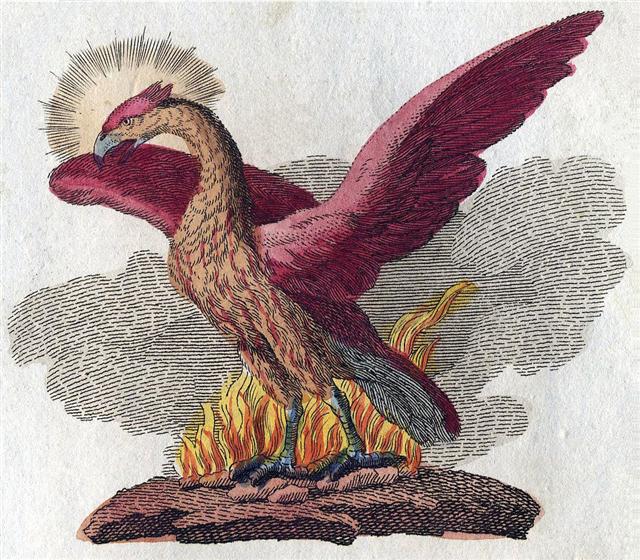 |
| Julian
equinox |
March 26 (85) |
27 (451) |
28 |
29 (88) |
30 |
31 (208 - 118) |
More
definite overall perceptions must, however, also incorporate the text on
side b of the tablet. Let's therefore here only try to summarize (as far as
such efforts are possible) line Ba10:
 |
 |
 |
 |
 |
 |
|
Ba10-1 (390) |
Ba10-2 |
Ba10-3 |
Ba10-4 |
Ba10-5 |
Ba10-6 |
|
ka mai ki te Raa |
kua vaha |
ko te henua |
kua puu ko te henua |
kua hakaora ia raua - kua hora koia -
kua hakatetea ko raua |
|
Vaha.
Hollow; opening; space between the fingers (vaha
rima); door cracks (vaha papare). Vahavaha,
to fight, to wrangle, to argue with abusive words.
Vanaga. 1. Space, before T; vaha takitua,
perineum. PS Mgv.: vaha, a space, an open place.
Mq.: vaha, separated, not joined. Ta.: vaha,
an opening. Sa.: vasa, space, interval. To.:
vaha, vahaa, id. Fu.: vasa, vāsaà,
id. Niuē: vahā.
2. Muscle, tendon; vahavaha,
id. Vahahora
(vaha 1 -
hora 2),
spring. Vahatoga
(vaha 1 -
toga 1),
autumn. 3. Ta.: vahavaha,
to disdain, to dislike. Ha.: wahawaha,
to hate, to dislike. Churchill.
Hora. Ancient name of
summer (toga-hora, winter summer). Vanaga. 1. In
haste (horahorau). 2. Summer, April; hora nui,
March; vaha hora, spring. 3. 'Hour', 'watch'. 4.
Pau.: hora, salted, briny. Ta.: horahora,
bitter. Mq.: hoáhoá, id. 5. Ta.: hora,
Tephrosia piscatoria, to poison fish therewith. Ha.:
hola, to poison fish. Churchill. Horahora, to
spread, unfold, extend, to heave to; hohora, to
come into leaf. P Pau.: hohora, to unfold, to
unroll; horahora, to spread out, to unwrap. Mgv.:
hohora, to spread out clothes as a carpet;
mahora, to stretch out (from the smallest extension
to the greatest), Mq.: hohoá, to display, to
spread out, to unroll. Ta.: hohora, to open, to
display; hora, to extend the hand in giving it.
Churchill.
Tetea.
To have many descendants. Vanaga.
The year was divided into summer and
winter - like day and night. They were 'born' (hanau)
in spring (in the morning of the year) respectively in
the evening of the year.
|
|
INVISIBLY CLOSE TO
THE SUN: |
|
APRIL 25 |
26 |
27 |
28 (118) |
29 |
30 (366 - 64 - 182) |
|
VISIBLE CLOSE TO THE
FULL MOON: |
|
Abhijit-22 (Victorious)
θ
Cor. Austr.
(281.0),
VEGA =
α Lyrae
(281.8) |
No star listed (282) |
ζ
Pavonis (283.4),
λ
Cor. Austr. (283.6),
DOUBLE DOUBLE =
ε
Lyrae
(283.7),
ζ
Lyrae (283.8)
*242.0 = *283.4 - *41.4 |
South Dipper-8 (Unicorn)
Φ
Sagittarii (284.0),
μ
Cor. Austr. (284.6),
η
Cor. Austr.,
θ
Pavonis (284.8) |
SHELIAK (Tortoise) =
β
Lyrae,
ν
Lyrae (285.1),
ο Draconis (285.5). λ
Pavonis (285.7)
ATLAS (27 Tauri) |
χ
Oct. (286.0),
AIN AL
RAMI (Eye of the Archer) = ν Sagittarii
(286.2),
υ
Draconis (286.4),
δ
Lyrae (286.3),
κ
Pavonis (286.5),
ALYA (Fat Tail) =
θ
Serpentis
(286.6)
*245.0 = *286.4 - *41.4 |
|
Dec 27 |
28 |
29 |
30 (364) |
31 |
Jan 1 |

... He went out alone in a boat to
fish with hook and line. During three days and nights he
caught nothing, but at length he caught
a turtle of five
colours. Wondering, he put it in the boat ... While he
slept the turtle suddenly became transformed into a
woman, in form beautiful beyond description ... He said
to her, 'This place is far from the homes of people, of
whom there are few on the sea. How did you so suddenly
come here? 'Smiling she replied, 'I deemed you a man of
parts alone on the sea, lacking anyone with whom to
converse, so I came here by wind and cloud.' 'You can
come to that region by a turn of your oar. Obey me and
shut your eyes.' So presently they came to a broad
island in the wide sea, which was covered with jewels.
(On it was a great mansion.) Its high gate and towers
shone with a brilliance which his eyes had never beheld
and his ears had never heard tell ... |
To
understand the text it is
necessary to rely on earlier views, for instance:
|
 |
'24 |
 |
|
Dec 6 |
Dec 30 |
|
RAS ALGETHI (*260) |
Φ Sagittarii
(*284) |

|
 |
15 |
 |
11 |
 |
20 |
 |
2 |
 |
|
Ba9-1
(341) |
Ba9-17
(357) |
Ba9-29 |
Ba10-1 (390) |
Ba10-4 |
|
MARCH 7 (50 + 16) |
MARCH 23
(82) |
APRIL 4
(94) |
APRIL 25
(115) |
(4 * 29½) |
|
ALGENIB
PERSEI = α Persei (50.0) |
KAJAM (Club) =
ω Herculis (248.3)
|
RAS ALGETHI =
α Herculis (260.8) |
VEGA (281.8) |
Φ Sagittarii (284.0) |
|
May 10
(80 + 50) |
26 (146
= 82 + 64) |
June 7 (131 + 27) |
28 (179) |
July 1 (182) |
|
'April
13 (53 + 50) |
29 (82 +
37) |
'May 11
(131) |
'June 1
(152) |
3 (155) |
|
"March
30 (39 + 50) |
"April
15 (105) |
27 (117) |
"May 18
(138) |
21 (141) |
When the
Sun was at Beltaine the Full Moon would be at Samhain,
where a little bed (cfr the 21st Hindu station Uttara Ashadha)
had been prepared. Because the 20th Hindu station (Purva Ashadha)
implied a winnowing basket. In
between was the
Victorious Vega → 22 → 3.14 * 7.
 |
 |
 |
 |
|
Ba10-7 (396) |
Ba10-8 |
Ba10-9 |
Ba10-10 (400 - 1) |
|
ki to ihe |
kua
rere ki ruga |
o te
marama |
|
Marama. 1. Month, light. The ancient
names of the month were: Tua haro, Tehetu'upú, Tarahao,
Vaitu nui, Vaitu poru, He Maro, He Anakena, Hora iti, Hora
nui, Tagaroa uri, Ko Ruti, Ko Koró. 2. Name of an
ancient tribe. Maramara, ember. Vanaga. Light, day,
brightness, to glimmer; month; intelligent, sensible; no
tera marama, monthly; marama roa, a long term;
horau marama no iti, daybreak; hakamarama,
school, to glimmer; hare hakamarama, school,
classroom. P Mgv.: màràma, the light, daylight;
maràma, wise, learned, instructed, moon. Mq.: maáma,
light, broad day, bright, instructed, learned; meama,
moon, month. Ta.: marama, moon, month. In form
conditionalis this word seems derivative from lama,
in which the illuminating sense appears in its signification
of a torch. The sense of light, and of specifically the
moon, appears in all Polynesia; in Futuna and Uvea the word
signifies the world. The tropical extension to the light of
intelligence is not found in Nuclear Polynesia, therefore
not in the Proto-Samoan, but is a later Tongafiti
development. Maramarama, bright; manava maramarama,
intelligent. P Pau.: maramarama, intelligent. Ta.:
maramarama, light, brightness. Churchill. The month
sense is found in Tahiti, Marquesas, Rarotonga and Maori
associated with the moon signification, and in Hawaii is
specifically dissociated therefrom to characterize a solar
month. Churchill 2.
 |
|
INVISIBLY CLOSE TO THE SUN: |
|
MAY 1 (BELTAINE) |
2 (122) |
3 |
4 (370
- 64 - 182) |
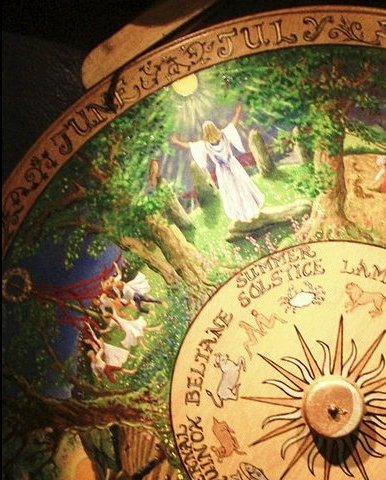
 |
|
VISIBLE CLOSE TO THE FULL MOON: |
|
ξ Sagittarii (287.1), ω Pavonis (287.3), ε Aquilae, ε Cor.
Austr.,
SULAPHAT (Little Tortoise Shell) = γ Lyrae (287.4),
λ Lyrae (287.7),
ASCELLA (Armpit) = ζ
Sagittarii,
BERED = i Aquilae (Ant.)
(287.9)
*246.0 = *287.4 - *41.4 |
Al Na'ām-18 (Ostriches) /
Uttara Ashadha-21 (Elephant tusk,
small bed)
NUNKI = σ
Sagittarii (288.4),
ζ Cor. Austr. (288.5),
MANUBRIUM = ο
Sagittarii
(288.8), ζ Aquilae (288.9)
*247.0 = *288.4 - *41.4 |
19h (289.2)
λ
Aquilae (Ant.) (289.1),
γ
Cor. Austr (289.3),
τ
Sagittarii (289.4),
ι
Lyrae (289.5),
δ
Cor.
Austr. (289.8)
*248.0 = *289.4 - *41.4
|
Al Baldah-19 (City)
AL BALDAH = π Sagittarii,
ALPHEKKA (Dish) MERIDIANA = α Cor. Austr.
(290.1), β Cor. Austr. (290.2) |
|
... This [σ
Sagittarii] has been identified with Nunki of the
Euphratean Tablet of the Thirty Stars, the Star of
the Proclamation of the Sea, this Sea being the
quarter occupied by Aquarius, Capricornus, Delphinus,
Pisces, and Pisces Australis. It is the same space in the
sky that Aratos designated as Water ... |
|
Jan 2 |
3 (80 + 288) |
4 |
5 (370 = 80 + 290) |
|
OCT 30 |
31 (80 + 224) |
NOV 1 (*225) |
2 (306) |
 |
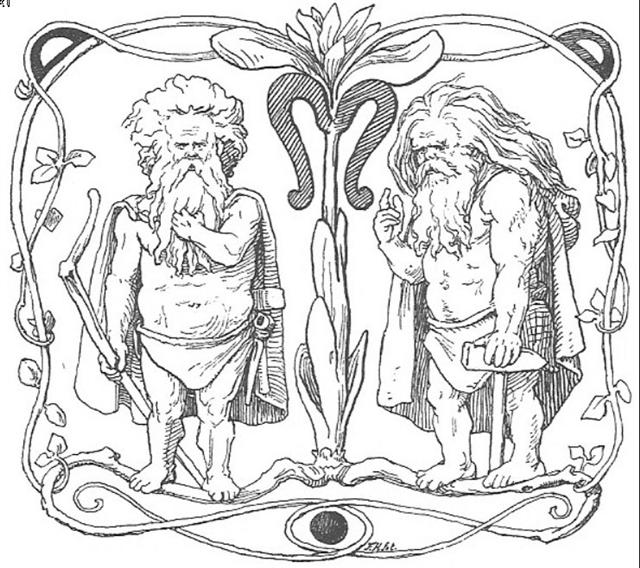
 |
 |
 |
 |
 |
 |
|
Ba10-11 (400) |
Ba10-12 |
Ba10-13 |
Ba10-14 |
Ba10-15 (→ 150) |
Ba10-16 |
|
ko te ika |
kua hagai |
ma to koe tagata ora ra ko to ihe |
kua rere ki to ragi - kua moe ko hau tea |
ki ruga o te tagata - kikiu atu |
kua rere te manu |
|
Kikiu. 1. Said of food
insufficiently cooked and therefore tough: kai kikiu.
2. To tie securely; to tighten the knots of a snare:
ku-kikiu-á te hereíga, the knot has been tightened.
3. Figuratively: mean, tight, stingy; puoko kikiu.
a miser; also: eve kikiu. 4. To squeak (of
rats, chickens). Kiukiu, to chirp (of chicks and
birds); to make short noises. The first
bells brought by the
missionaries were given this name. Vanaga. Kiukiu
(kikiu). 1. To resound, to ring, sonorous, bell,
bronze; kiukiu rikiriki, hand bell; tagi
kiukiu, sound of a bell; kikiu, to ring, the
squeeking of rats; tariga kikiu, din, buzzing;
hakakiukiu, to ring. Mgv.: kiukiu, a thin
sound, a soft sweet sound. 2. To disobey, disobedience;
mogugu kiukiu, ungrateful; ka kikiu ro, to
importune. Churchill.
.jpg)
Atu. Particle of meaning opposite
to that of mai; it refers to the second or third
person, expressing movement away: ka-avai-atu,
give it to him: he-oho-atu au, I am going there,
after you; i-oho-atu-era, when I had gone there.
Vanaga. 1. a. Directive, of motion from the speaker. b.
Somewhat expressive of the comparative degree. 2. Pupil;
hakaatu, proof; hare hakaatuga,
schoolhouse, class. 3. (hakaatu), to presage. 4.
(hakaatu), mark, object. Churchill.
|
|
INVISIBLY CLOSE TO
THE SUN: |
|
MAY 5 (5 *
5 * 5) |
6 |
7 |
8 (128) |
9 |
10 |
|
VISIBLE CLOSE TO THE
FULL MOON: |
|
ALADFAR (The Talons) = η Lyrae
(291.1),
NODUS II = δ Draconis
(291.5), ψ Sagittarii (291.6), τ Draconis (291.7), θ
Lyrae (291.8) |
ω Aquilae (292.1), ρ Sagittarii (292.6), υ Sagittarii
(292.7) |
π Draconis,
ARKAB PRIOR = β¹ Sagittarii
(293.0),
ARKAB POSTERIOR = β² Sagittarii,
ALRAMI (The Archer) = α Sagittarii
(293.2), χ Sagittarii (293.6) |
DENEB OKAB (Tail of the Eagle) =
δ
Aquilae (Ant.)
(294.0),
α VULPECULAE (Little Fox)
(294.9) |
ν
Aquilae (Ant.) (295.0),
ALBIREO - Hen's Beak =
β
Cygni
(295.5) |
ALSAFI (Fire Tripod) =
σ
Draconis
(296.0),
μ
Aquilae (296.3),
ι
Aquilae (Ant.)
(296.8), κ Aquilae (Ant.) (296.9) |
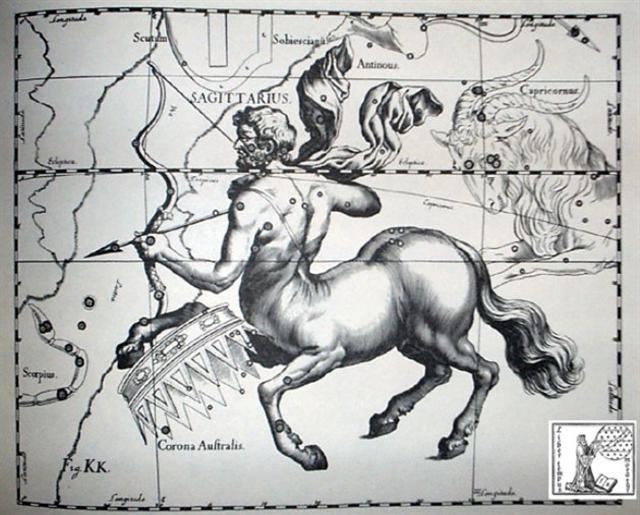 |
|
Jan 6 |
7 |
8 |
9 (374) |
10 |
11 |
|
NOV 3 |
4 |
5 |
6 (310 = 294 + 16) |
7 |
8 |
 |
 |
 |
 |
 |
|
Ba10-17 |
Ba10-18 |
Ba10-19
(408) |
Ba10-20 |
Ba10-21 |
|
i te tagata ure huki |
no ona |
koia anake |
ka mou ia |
mai tae tuki te henua |
|
Anake, unique. T Pau.:
anake, unique, to be alone. Mgv.: anake,
alone, single, only, solely. Mq.: anake,
anaé, id. Ta.: anae, all, each, alone,
unique. Anakena, July. Ananake,
common, together, entire, entirely, at once, all,
general, unanimous, universal, without distinction,
whole, a company; piri mai te tagata ananake,
public; kite aro o te mautagata ananake,
public; mea ananake, impartial; koona
ananake, everywhere. Churchill.
Mou. 1. Enough (moua, mouga).
PS Sa.: mou, many. 2. To get (mau);
hakamou, id. 3. To use up, to expand, to
absorb; hakamou, to spend; hakamoumou, to
use up, to expend. 4. To be silent, shy,
dejected, stupid, taciturn, mute, uncomplaining,
silence, shut up!, attention!; mou no, to
speak in laconic terms, dull, mute, silence;
hakamou, to silence, to shut up, to quiet.
Mq.: mou, peace, tranquil, quiet. 5. To
cease, to end, to finish, to conclude; a pact,
agreement; mou noa, to endure (mau);
mou a te toua, reconciliation; ina kai
mou, always, eternal, perpetual; ina e ko
mou, incessant; e ko mou, always;
tae mou, permanent, perpetual; hakamou,
to accomplish, to end, to conclude, to
consummate, to conciliate; e ko moumou,
indissoluble; hakamoumouga, the finish,
termination, Mgv.: mou, to quench the
thirst. 6. To harass; mou no, to suffer
damage; hakamou, to abolish, abrogate,
annihilate, nullify, annul, impoverish, destroy,
interrupt, exsterminate, plunder, smooth out
folds; moumou, to devastate, pillage,
devastation, destruction; hakamoumou, to
demolish, to ravage, to suppress. Ta.: mou,
to extinguish, to destroy. Moua, enough,
past (mou, mouga). Churchill.
|
|
INVISIBLY CLOSE
TO THE SUN: |
|
MAY 11 |
12 |
13 (133) |
14 |
15 |
|
VISIBLE CLOSE TO
THE FULL MOON: |
|
ε Sagittae (297.1),
σ
Aquilae (Ant.) (297.4),
SHAM (Arrow) = α Sagittae
(297.8)
*256.0
= *297.4 - *41.4 |
β Sagittae (298.0), χ Aquilae (298.3), ψ Aquilae
(298.8) |
υ Aquilae (299.1),
TARAZED (Star-striking Falcon) = γ Aquilae
(299.3), δ Sagittae (299.6), π Aquilae (299.9) |
Sravana-23 (Ear or Three
Footprints)
TYL =
ε
Draconis
(300.0),
ζ
Sagittae (300.1),
ALTAIR (Flying Eagle) = α Aquilae
(300.3),
ο
Aquilae (300.5),
BEZEK =
η
Aquilae (Ant.)
(300.8) |
ι Sagittarii (301.2),
TEREBELLUM = ω Sagittarii,
ξ Aquilae (301.3),
ALSHAIN (Falcon) = β Aquilae
(301.6), φ Aquilae (301.8) |
 |
|
Jan 12 (377) |
13 |
14 |
15 |
16 |
|
NOV 9 |
10 (314) |
11 |
12 |
13 |
 |
 |
 |
|
Ba10-22 |
Ba10-23 |
Ba10-24 (413 = 14
* 29½) |
|
kua
moe ko te manu |
ki to
ika |
e tagata haga era ki te
mea ke |
|
INVISIBLY CLOSE
TO THE SUN: |
|
MAY 16 (136) |
17 |
18 |
|
VISIBLE CLOSE TO
THE FULL MOON: |
|
ε Pavonis, θ Sagittarii (302.3), γ Sagittae (302.5),
μ Pavonis (302.7) |
τ Aquilae (303.8) |
20h
(304.4)
304.4 = 118.4 + 186.0
η Sagittae (304.2),
δ
Pavonis (304.4)
*263.0 = *77.0 + *186.0 |
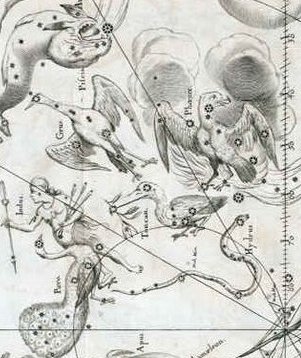 |
|
Jan 17 (382) |
18 |
19 |
|
NOV 14 |
15 |
16 (320 = 384 -
64) |
|
Jan 19
(*304) |
*16 |
Febr
4 (*320) |
|
δ Pavonis |
δ Pavonis |
|
*304 -
*64 = *240 |
*320 -
*64 = *256 |
|
NOV 16
(320 = 384 - 64) |
DEC 2 (336 = 4 * 84) |
|
 |
*179.0 |
 |
|
BRIGHT
FIRE (*125.4) |
δ Pavonis
(*304.4)
|
|
*125 -
*64 =
*61
= *145 - *84 = *320 - *259 = *240 - *179 |
|
 |
 |
 |
 |
|
Ba10-25 |
Ba10-26 (314
+ 101) |
Ba10-27 |
Ba10-28 |
|
ko agaagata |
kua
maa |
ko koe - e kua hatu ko to
toa |
e tagata haga - i to
ua e kua koti
ko te henua |
|
INVISIBLY
CLOSE TO THE SUN: |
|
MAY 19 |
20 (140) |
21 |
22 |
|
VISIBLE CLOSE
TO THE FULL MOON: |
|
SHANG WEI (Higher Guard) =
κ
Cephei
(305.2),
θ
Sagittae (305.4), TSEEN FOO (Heavenly Raft) =
θ
Aquilae (Ant.)
(305.6), ξ Capricorni (305.8)
*264.0 = *305.4 - *41.4 |
TSO KE (Left Flag) =
ρ
Aquilae
(306.3) |
GREDI (Goat) =
α
Capricorni
(307.2),
σ
Capricorni (307.5),
ALSHAT (The Sheep) = ν Capricorni
(307.9) |
Al Sa’d al Dhabih-20
(Lucky One of the Slaughterers) /
Ox / Herd Boy-9
(Buffalo)
DABIH =
β
Capricorni
(308.0),
κ
Sagittarii (308.1),
SADIR (Hen's Breast) =
γ
Cygni (308.4),
PEACOCK =
α
Pavonis
(308.7)
*267.0 = *308.4 - *41.4 |
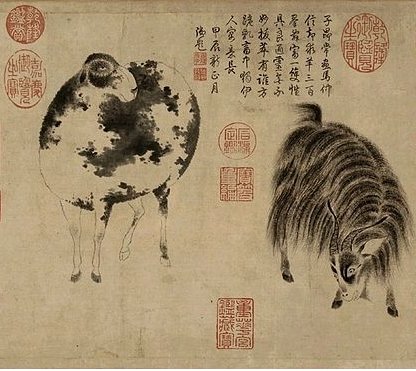 |
|
Jan 20 |
21 |
22 |
23 (388) |
|
NOV 17 |
18 |
19 |
20 (324 = 340
- 16) |
 |
 |
 |
 |
|
Ba10-29 |
Ba10-30 |
Ba10-31
(420 = 7 * 60) |
Ba10-32 (→ 320) |
|
ma te
maitaki |
koia ra kua hoki to
rarahoi |
kua tu ki to
toga |
Etagata itiiti |
|
Rara.
Mgv.: a branch of a tree. Ta.: rara,
id. Mq.: rara, small branches. Sa.:
lala, id. Ma.: rara, id.
Churchill.
Toga.
1. Winter season. Two seasons used to be
distinguished in ancient times: hora,
summer, and toga, winter. 2. To lean
against somehing; to hold something fast;
support, post supporting the roof. 3. To
throw something with a sudden movement. 4.
To feed oneself, to eat enough; e-toga
koe ana oho ki te aga, eat well first
when you go to work. Vanaga. 1. Winter. P
Pau., Mgv.: toga, south. Mq.:
tuatoka, east wind. Ta.: toa,
south. 2. Column, prop; togatoga,
prop, stay. Togariki, northeast wind.
Churchill. Wooden platform for a dead
chief: ka tuu i te toga (Bb8-42),
when the wooden platform has been erected.
Barthel 2. The expressions Tonga,
Kona, Toa (Sam., Haw., Tah.), to
indicate the quarter of an island or of the
wind, between the south and west, and
Tokelau, Toerau, Koolau
(Sam., Haw., Tah.), to indicate the opposite
directions from north to east - expressions
universal throughout Polynesia, and but
little modified by subsequent local
circumstances - point strongly to a former
habitat in lands where the regular monsoons
prevailed. Etymologically 'Tonga', 'Kona',
contracted from 'To-anga' or 'Ko-ana',
signifies 'the setting', seil. of the sun. 'Toke-lau',
of which the other forms are merely
dialectical variations, signifies 'the cold,
chilly sea'. Fornander.
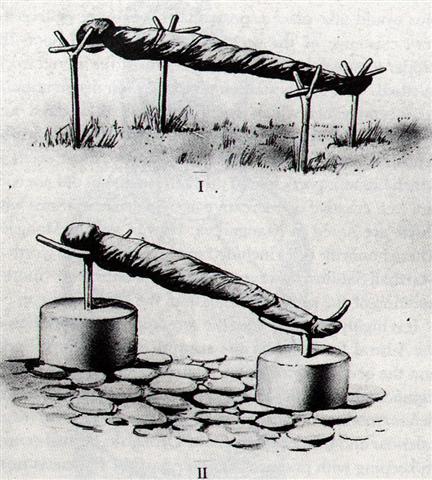 |
|
INVISIBLY
CLOSE TO THE SUN: |
|
MAY 23 |
24 (12 *
12) |
25 (145) |
26 |
|
VISIBLE
CLOSE TO THE FULL MOON: |
|
OKUL =
π
Capricorni
(309.6),
BOS =
ρ
Capricorni
(309.9)
ARNEB
(α Leporis)
MINTAKA (δ Orionis) |
ο
Capricorni (310.2),
θ
Cephei (310.5)
HEKA (λ
Orionis)
ALNILAM (ε Orionis) |
ROTTEN MELON =
ε
Delphini,
φ
Pavonis (311.2),
η
Delphini (311.4),
ζ
Delphini,
ρ
Pavonis (311.7)
PHAKT (α
Columbae)
ALNILAK (ζ
Orionis)
*270.0 = *311.4 - *41.4 |
ROTANEV =
β
Delphini,
ι
Delphini (312.3),
τ
Capricorni (312.6),
κ
Delphini (312.7),
SVALOCIN =
α
Delphini,
υ
Capricorni,
υ
Pavonis (312.8) |
|
Jan 24 |
25 |
26 |
27 (392) |
|
NOV 21 |
22 |
23 |
24 (328) |
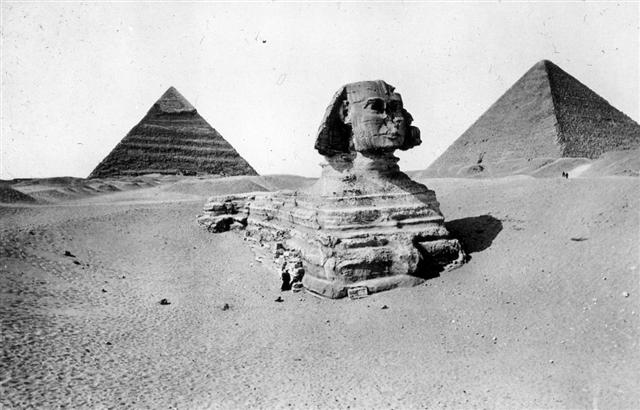 |
 |
70 |
 |
110 |
 |
|
Ba9-5
(345 =
300 + 45) |
Ca5-20 (125) |
Ba9-5
(135 ← 527 → 364) |
|
ki te mea ke |
hakapekaga
mai |
ki te mea ke |
|
δ
Persei (54.7) |
Bright Fire (125.4)
*125.4 - *41.4 = *84.0 |
ζ Cor.
Borealis (236.9) |
|
May 14
(134 = *419) |
July 24
(205 = *490) |
Nov 12
(316 = *236 = *601 - *365) |
|
"April 3
(93, *13 = *378) |
"June 13
(164, *84 = *449) |
"Oct 2
(275 = *195 = *560 - *365) |
|
MARCH 11 (70, *355) |
MAY 21
(141, *61 = *426) |
SEPT 9
(252, *172 = *537 - *365) |
|
183 |
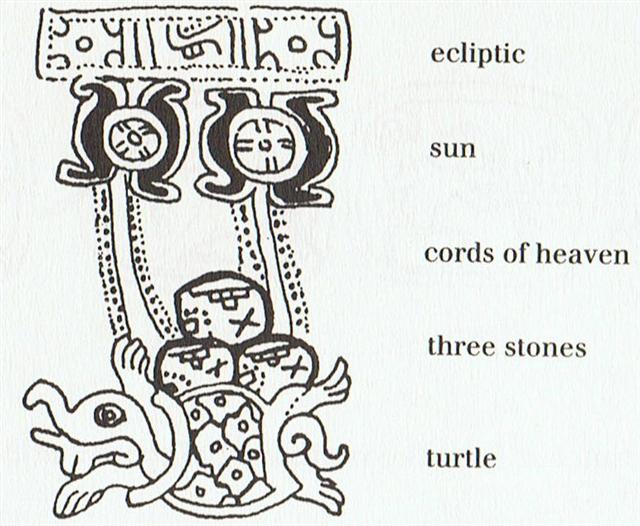
|
























.jpg)

























